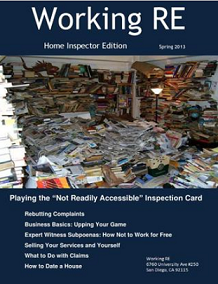
|
Home Inspectors Edition | Circulation 22,000 | Advertise | Subscribe | |
Published by OREP, E&O Insurance Experts | February 2013 |
 Playing the "Not Readily Accessible" Inspection Card |
>
Click to Print
|
If you are going to respond with your side of
the story, to either a disgruntled client or to your insurance company,
there are commonsense basics to keep in mind.
>
This story is excerpted from the new
Working RE Magazine- Home Inspector Edition.
If you haven't already,
take a look!
>>Cover
Story:
Playing the "Not Readily Accessible" Inspection Card
Rebutting Complaints
By David Brauner, Senior Broker at OREP.org
First, contact your insurance agent right away. Why not get the help
of the insurance company pros when responding to a complaint?
Get the experts on your side.
Not only is it smart but it is typically required: most
insurance policies obligate you to notify the insurance company
immediately and prior to responding to the complaint directly, as a
condition of coverage. Having
said that, if you are going to respond with your side of the story, to
either a disgruntled client or to your insurance company, there are
commonsense basics to keep in mind.
When a dissatisfied homeowner dashes off a complaint that is heated,
insulting, inaccurate or not very well thought-through- maybe just a
belligerent phone call, it is human nature for us to take it less
seriously and to want to respond in kind: garbage in, garbage out.
But that’s a mistake. No
matter how crude or “stupid” a customer’s complaint seems, your
response must be professional; after all, it is your livelihood on the
line not theirs. Think twice
before dashing off an angry reply to an emailed complaint especially;
most of us regret not exercising better judgment and patience before
hitting “send” at least once or twice in our lives.
Shooting Yourself in the Foot
Many professionals damage their own defense by ill-advised,
half-baked
responses to complaints.
It’s called shooting yourself in
the foot. Not taking
every complaint seriously is how it happens.
Often, shortly after receiving a homeowner’s irrational,
undocumented and half-baked complaint- one that seems not even worth
considering, the formal notice arrives on legal letterhead, usually
via certified mail, from his cousin Joe the attorney. When this
happens, you’re a whole lot happier if you have kept your powder dry
and your mouth shut.
If you ever do have occasion to respond to a
complaint, either to the client or to your insurance company, it is
important to remain rational, unemotional and professional. Below is a
good example of such a response. A good rebuttal/response letter
doesn’t guarantee a successful outcome, but it does help you avoid
doing any unnecessary damage to your own defense.
What’s professional? Proper spelling and grammar are givens. Avoid profanity and not taking the complaint seriously and/or
dismissing the client as an idiot or scammer or something along
those lines. If you are unable
to put together a rational, thought out, clearly-communicated response
or don’t bother to verify as accurate what you’re saying, what does
that say about the kind of inspector you are and the quality of your
service/product? And what does
that tell the insurance company about the kind of risk they are taking
on by insuring you for $100,000 or $1,000,000?
(story continues below)

(story continues)
If you did something wrong, admit it. Whether you made a mistake or
not, try to learn from the complaint.
In your response, note any routines or procedures you will set
in place to avoid the same situation happening again, if possible.
(After all, innocent or guilty, responding to a complaint costs you
time and money. If it can be avoided in the future, everyone is
happier.) Here is an example
of a prudent response: “While
I clearly never said anything like that to the client, and my report
bears that out, I understand how discussing an issue of that nature
with the client opened the door to this type of complaint.
To avoid this happening in the future, I will take notes of
every verbal conversation of this nature or avoid them altogether and
put everything in writing, into the report.”
Sometimes the insurance company claims adjusters will not ask for
much beyond a short statement and your report and contract.
Usually your report and contract contain most of what they need
to know. If they need more,
they might conduct a verbal interview with you over the phone.
This may seem informal but again, be on guard-everything you
say matters. Be truthful and
careful.
Whether
you respond over the phone or in writing, the same rules apply. Be
prepared. Have the facts at your fingertips.
Document everything you say. Don’t guess. If you don’t know,
find out before answering.
Never be pressured into making a decision or to respond before
you’re ready. If you’re uncomfortable giving responses verbally,
request the questions in writing so you can take your time preparing
your written reply. Some people think on their feet better than
others. You can always
say, “Please send me the questions in writing so I can be as accurate
as possible in my responses.”
Click to read the rest of the story in the new
Working RE Home Inspector
Edition: a
complaint letter from a homeowner, alleging the inspector did not
properly inspect the chimney and roof, and the inspector's "winning"
response.
Click to read (story pg. 13).
ATTENTION: You are receiving WRE Online News because you opted in at WorkingRE.com or purchased E&O insurance from OREP. WRE Online News Edition provides news-oriented content twice a month. The content for WRE Special Offer Editions is provided by paid sponsors. If you no longer wish to receive these emails from Working RE, please use the link found at the bottom of this newsletter to be removed from our mailing list.



